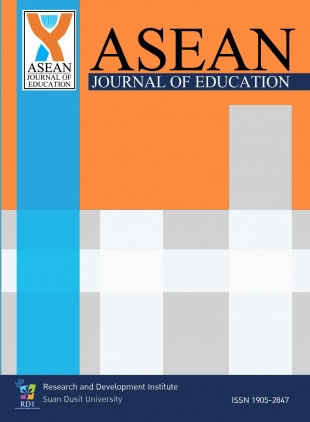Development of Mobile Application Supporting Students’ Study Plans and Learning Processes: The Needs and Satisfaction of Users
Keywords:
Mobile application, Study plan, Learning processAbstract
Digital technology has demonstrated its contribution to teaching and learning and educational management. With student-centered awareness, the mobile application enhancing students’ study plans and learning processes was developed. The purpose of this research was to examine the needs of undergraduate students of Suan Dusit University on a mobile application supporting their study plans and learning processes. A needs analysis was conducted to develop the mobile application. The application was developed based on needs. Examining the satisfaction of the undergraduate students, the faculty members and the administrators of Suan Dusit University towards the mobile application supporting the students’ study plans and learning processes, was conducted.
The samples comprised of 3 groups: The first group consisted of 120 undergraduate students studying on campus and at off-campus Science Center, the second group was 30 faculty members who acted as advisors working on campus and at off-campus Science Center and the third group consisted of 12 administrators who were relevant to the management of students’ study plans. Purposive sampling technique was used to select the samples of each group. A research and development method was used. The research tools comprised of 8 open-ended questions used fora needs analysis and a 20-item Satisfaction Questionnaire used to measure the samples’ satisfaction towards the mobile application regarding the content and the usability, the design, the manual and the overall satisfaction of each function. The validity and reliability of the questionnaire were determined, confirming validity and high internal reliability.
The findings revealed that most of the students considered the Enrollment as the most essential function of the mobile application. The other important functions were Academic Calendar, Grade, Payment, Library, Advisor, Request, Assessment and Map, respectively. The overall satisfaction of the students, the faculty members and the administrators of Suan Dusit University towards the developed mobile application on the functions of Grade, Payment, Library, Request and Enrollment were at the highest level with the mean scores of 5.56, 5.53, 5.52 and 5.51, respectively.
References
Chatpreecha, P. (2016). The development of mobile applications introduces the Institute of Intelligence Management information on the Android operating system. Panyaphiwat Journal, 8(1), 237-249.
Chiang Mai University. (2019). Online services from the office of information technology services. Retrieved 2019, December 4, from https://acc.acc.cmu.ac.th/onlineservices.php
Khon Kaen University. (2016). Launching KKU CASCAP App, the application from KKU. Retrieved 2019, October 14, from https://cascap.kku.ac.th/kku-cascap-app/
Kunalittipon, k. (2014). Studying factors that effect the intention of using the application BU mobile. (Master’ thesis). Bangkok University, Faculty of Information Technology and Management, Department of Information Technology.
Rattanamahattana, K. (2018). The time of the AI change Retrieved 2019, October 14, from https://web.tcdc.or.th/th/Articles/Detail/%E0%B9%80%E0%B8%A1%E0%B8%B7%E0%B9%88%E0%B8%AD-AI
Roger, N. (2009). Supporting 21st century learning through Google apps. Teacher Librarian. 37(2), 35-38.
Saekow, O. (2015). Web application for knowledge management through mobile phones for undergraduate students. (Master’ thesis). Rajamangala University of Technology Thanyaburi, Faculty of Industrial Education, Department of Educational Administration Technology.
Saetiew, C. (2016). Usage behavior of smart-phone applications for middle age persons. Business Administration. (Master’ thesis). Rajamangala University of Technology Thanyaburi, Faculty of Business Administration, Department of Information System.
Sombat, P. (2015). Thai mobile application development guidelines for airline users Thai airways international public company limited. (Master’s thesis). Suranaree University of Technology, Civil Aviation Institute, Department of Aviation Management.
Thammasat University. (2019). Application for students. Retrieved 2019, October 14, from http://ultimatethammasat.com/featured/2019/education-app
Wai, I. S. H., Ng, S. S. Y., Chiu, D. K., Ho, K. K., & Lo, P. (2018). Exploring undergraduate students’ usage pattern of mobile apps for education. Journal of Librarianship and Information Science, 50(1), 34-47.
Webuild & Operate Co., Ltd. (2019). iConnect University. Retrieved 2019, October 14, from http://webuild.co.th/site/index.php/produc.
Worapitbenja, P., Klinhnu, J., & Srisom, N. (2015). Development of applications to organize teaching in virtual classrooms on mobile devices. Academic Journal of the Faculty of Industrial Technology Lampang Rajabhat University, 8(2), 58-67.
Yen, J. Y., Yen, C. F., Chen, C. S., Wang, P. W., Chang, Y. H. & Ko, C. H. (2012) Social anxiety in online and real–life interaction and their associated factors. Cyberpsychology, Behavior and Social Networking, 15(1), 7-12.
Downloads
Published
How to Cite
Issue
Section
License

This work is licensed under a Creative Commons Attribution-NonCommercial-NoDerivatives 4.0 International License.
1 All articles will undergo a formal peer-review. A panel of experts from within or without the university will examine the article; approval from a minimum of two experts is required for publication. Revisions posed by the experts must be completed by the research prior to publication.
2 Once published in the ASEAN Journal of Education, the article becomes intellectual property of Suan Dusit University. Duplication, in full or part, requires permission from Suan Dusit University.
3 Excluding errors incurred during printing, author(s) are responsible for the content of their articles.






